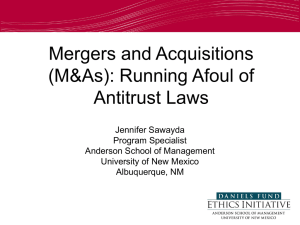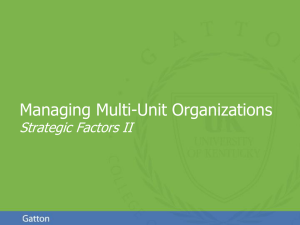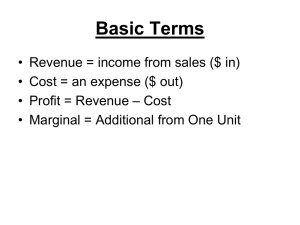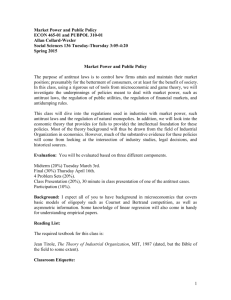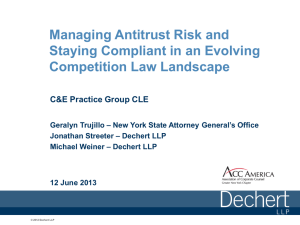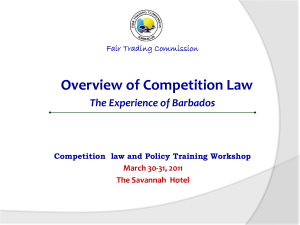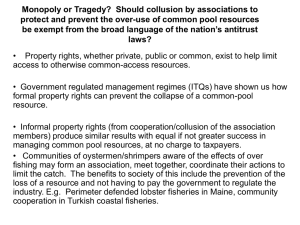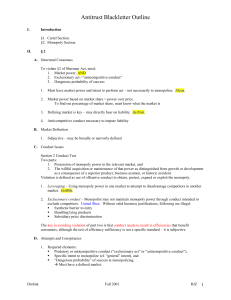FEDERAL ANTITRUST LAW: OVERVIEW
advertisement
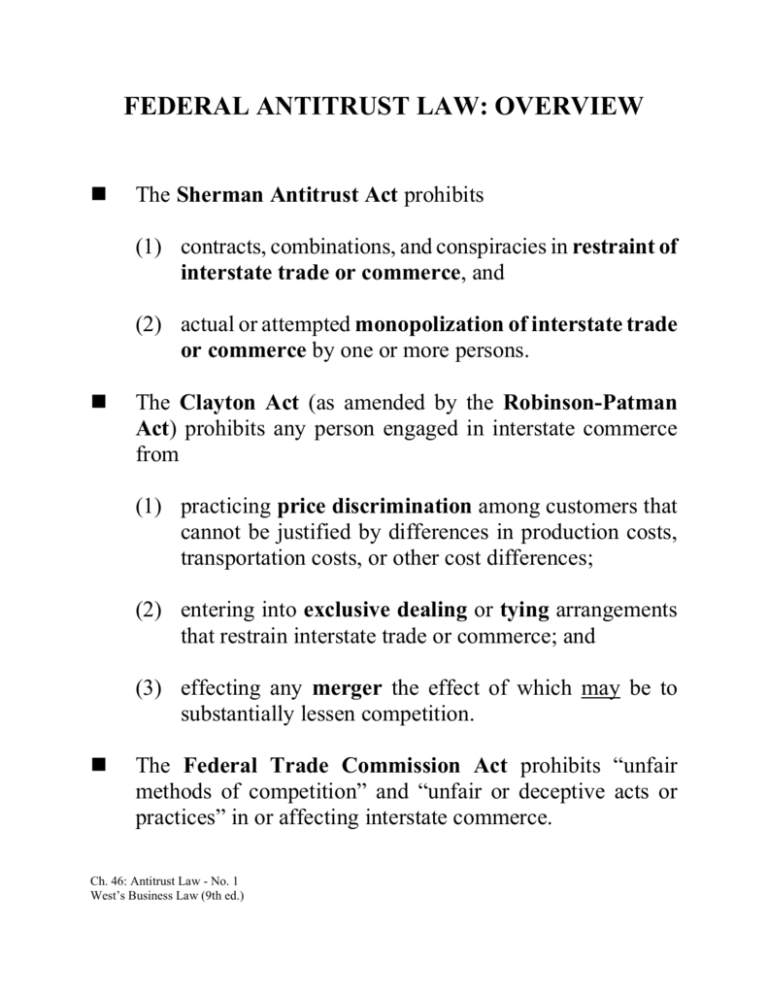
FEDERAL ANTITRUST LAW: OVERVIEW The Sherman Antitrust Act prohibits (1) contracts, combinations, and conspiracies in restraint of interstate trade or commerce, and (2) actual or attempted monopolization of interstate trade or commerce by one or more persons. The Clayton Act (as amended by the Robinson-Patman Act) prohibits any person engaged in interstate commerce from (1) practicing price discrimination among customers that cannot be justified by differences in production costs, transportation costs, or other cost differences; (2) entering into exclusive dealing or tying arrangements that restrain interstate trade or commerce; and (3) effecting any merger the effect of which may be to substantially lessen competition. The Federal Trade Commission Act prohibits “unfair methods of competition” and “unfair or deceptive acts or practices” in or affecting interstate commerce. Ch. 46: Antitrust Law - No. 1 West’s Business Law (9th ed.) TESTING ALLEGED VIOLATIONS Alleged violations of the Sherman and Clayton Acts are tested against one of two standards: Per Se Violation: Certain anticompetitive acts or agreements (e.g., a price fixing agreement among competitors) are considered to be so injurious to the public that there is no need to determine whether competition is actually reduced or otherwise injured – they are violations of the Sherman Act per se; and Rule of Reason: Acts or agreements that are not considered to be illegal per se are analyzed by comparing their positive effects (e.g., efficiency) against their potentially anticompetitive effects. If the act or agreement is found not to unreasonably restrain trade, it will not be considered a violation of the Sherman Act. Less Restrictive Means: Courts will often look to see if the parties could have achieved the same benefits using means that would have had a less restrictive effect on competition. Ch. 46: Antitrust Law - No. 2 West’s Business Law (9th ed.) HORIZONTAL RESTRAINTS Horizontal Restraint: Any agreement that restrains competition between rival firms operating in the same geographic or product market. Price Fixing: An agreement between competitors to fix the prices of products or services. Such agreements are illegal per se. Group Boycott: An agreement between sellers to boycott, or refuse to deal with, a particular person or group of persons. Such agreements are illegal per se. Market Division: An agreement between sellers to divide territories or customers into smaller, exclusive markets. Such agreements are illegal per se. Trade Association: Persons in the same industry or profession may organize for the purpose of, e.g., exchanging information, lobbying, advertising, and setting standards. The anticompetitive effects of trade association activities are tested using the rule of reason. Joint Venture: As long as a joint venture does not engage in price fixing or market division, its anticompetitive effects are tested using the rule of reason. Ch. 46: Antitrust Law - No. 3 West’s Business Law (9th ed.) VERTICAL RESTRAINTS Vertical Restraint: Any agreement between firms at different levels in the manufacturing and distribution process that restrains competition. Territorial or Customer Restriction: An arrangement whereby a manufacturer institutes restrictions on a seller’s territory or the types of customers to whom the seller may sell the manufacturer’s goods. The anticompetitive effects of such an arrangement are tested using the rule of reason. Resale Price Maintenance: An agreement between a manufacturer and a retailer in which the manufacturer specifies (rather than suggests) the minimum retail price at which the retailer may sell the manufacturer’s products. Such agreements are illegal per se. Maximum resale price fixing is not illegal per se, and should be tested using the rule of reason. Refusal to Deal: Unilateral action by a manufacturer who refuses to deal with one or more retailers or other customers. The anticompetitive effects of such an action are tested using the rule of reason. Ch. 46: Antitrust Law - No. 4 West’s Business Law (9th ed.) MONOPOLIZATION Monopolization requires (1) the possession of monopoly power in the relevant product or geographic market; and The relevant product market includes, at a minimum, all other goods with identical or substantially identical attributes, as well as all other goods that are reasonable substitutes. The relevant geographic market includes, at a minimum, the territory in which the alleged monopolist actually sells its product. (2) the willful acquisition or maintenance of such power, as distinguished from its growth or development due to a superior product, business acumen, or accident. Predatory Pricing: Pricing a product below the cost of producing it in order to drive competitors out of a market. Attempted Monopolization: Any action designed to eliminate competition and gain monopoly power. Ch. 46: Antitrust Law - No. 5 West’s Business Law (9th ed.) PRICE DISCRIMINATION Price Discrimination occurs when a seller charges different prices for the same goods or services to competing buyers. In order to violate § 2 of the Clayton Act, the effect of the price discrimination must be to (1) substantially lessen competition or (2) create a competitive injury. Price discrimination based on differences in production costs, transportation costs, or other cost differences will not result in a violation of the Clayton Act. Price discrimination will also be excused if the seller can prove that it lowered its prices temporarily in an effort to match or beat the price of a competing seller. The allegedly discriminating seller must be engaged in interstate commerce; however, the allegedly discriminatory prices need not be charged to buyers in different states. Ch. 46: Antitrust Law - No. 6 West’s Business Law (9th ed.) EXCLUSIONARY PRACTICES Exclusive-Dealing Contract: An agreement by which a seller forbids a buyer from purchasing products from the seller’s competitors is illegal if the agreement would substantially lessen competition or would tend to create monopoly power. Tying Arrangement: An agreement between a buyer and a seller, which obligates the buyer of a specific product or service to buy additional products or services from the seller. Section 3 of the Clayton Act applies only to tying arrangements involving the sale of products; however, tying arrangements involving services may be illegal under § 1 of the Sherman Act. Ch. 46: Antitrust Law - No. 7 West’s Business Law (9th ed.) HORIZONTAL MERGERS Horizontal Merger: A merger between two firms that are competing in the same product or geographic market. Horizontal mergers will generally be deemed illegal if they result in a significant increase in market concentration – in this case, the merged firm’s percentage of sales in the relevant geographic and product markets. The courts, the FTC, and the DOJ will also consider the following factors: (1) overall concentration in the relevant markets, (2) the trend toward concentration in the relevant markets, (3) whether the purpose of the merger appears to be to establish market power or restrict competition, (4) ease of entry into the relevant markets, (5) economic efficiency considerations, and (6) the financial condition of the merging firms. Ch. 46: Antitrust Law - No. 8 West’s Business Law (9th ed.) VERTICAL MERGERS Vertical Merger: A merger of one firm at a particular stage of the production and distribution (e.g., raw materials provider) with another firm at a different stage of the production and distribution process (e.g., manufacturer) of the same product. The legality of a proposed vertical merger will typically be determined by considering: (1) market concentration in both the “upstream” and “downstream” markets, (2) ease of entry into both markets, and (3) the apparent intent of the merging parties – i.e., as with a horizontal merger, whether the purpose of the merger appears to be establishing market power or restricting competition as opposed to promoting efficiencies. Ch. 46: Antitrust Law - No. 9 West’s Business Law (9th ed.) CONGLOMERATE MERGERS Conglomerate Merger: A merger between firms that do not compete with each other in the same product and geographic market. Market-Extension Merger: A merger designed to give a firm access to a market in which it does not compete but in which the firm with which it is merging does compete. Product-Extension Merger: A merger designed to permit a firm to add one or more product lines closely related to its pre-merger product lines. Diversification Merger: A merger between two firms previously selling unrelated products in unrelated markets. The legality of a proposed conglomerate merger will typically be determined by considering: (1) whether the acquiring firm will be able to shift assets and revenues to the acquired firm, harming the acquired firm’s competitors, and (2) the merger’s effect on ease of entry into the relevant markets. Ch. 46: Antitrust Law - No. 10 West’s Business Law (9th ed.) INTERLOCKING DIRECTORATES Section 8 of the Clayton Act imposes restrictions on the ability of any person to serve simultaneously on the board of directors of two or more corporations that are in competition with one another. Ch. 46: Antitrust Law - No. 11 West’s Business Law (9th ed.) ENFORCING ANTITRUST STATUTES Enforcement Agencies: Federal antitrust laws are enforced by the U.S. Department of Justice (DOJ), and Federal Trade Commission (FTC). Private Enforcement: Individuals and companies who have been injured by the anti-competitive behavior of others may recover privately under federal antitrust law if they can show: (1) that the alleged antitrust violation either directly caused, or was at least a substantial factor in causing, the injury suffered; and (2) that the unlawful actions of the defendant(s) affected the plaintiff in some way that federal antitrust law was designed to prevent. Ch. 46: Antitrust Law - No. 12 West’s Business Law (9th ed.) ANTITRUST EXEMPTIONS Labor Organizing: Labor unions may organize, bargain collectively, and strike without violating antitrust law. Agricultural and fishing cooperatives are allowed to combine their efforts and set prices for their products. Insurance companies that are subject to state regulation are exempt from antitrust law, except when they boycott, coerce, or intimidate. Foreign Trade: U.S. exporters may cooperate to compete with foreign cooperatives, as long as their doing so does not restrain trade within the U.S. or injure other U.S. exporters. Professional baseball is, except with respect to free agency, exempt from antitrust law. Certain forms of cooperative research and production among otherwise competitive firms are exempt. The Noerr-Pennington Doctrine exempts collective efforts to obtain or influence legislative or executive action. The State Action Doctrine exempts actions undertaken by a business in accordance with clearly articulated state policy and under the direct supervision of state regulators. Ch. 46: Antitrust Law - No. 13 West’s Business Law (9th ed.)
